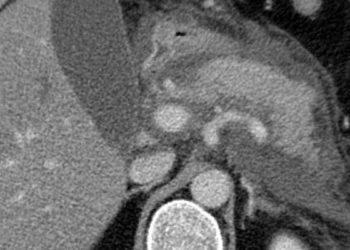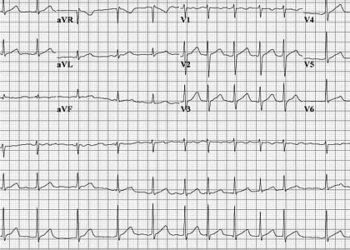Dabigatran linked with more major bleeds, fewer intracranial hemorrhages vs warfarin
1. Patients with non-valvular atrial fibrillation who were receiving dabigatran for prevention of stroke and systemic embolism had a higher risk of major bleeding complications when compared with patients taking warfarin. The risk for intracranial hemorrhage, however, was lower, especially amongst older adults.
2. The study also identified several groups of patients at a significantly higher risk of major bleeds, regardless of the anticoagulant, such as adults over 75 years of age, African Americans, and patients with chronic kidney disease.
Evidence Rating Level: 2 (Good)
Study Rundown: The FDA approved dabigatran in 2010 for the prevention of stroke and systemic embolism in patients with non-valvular atrial fibrillation. In initial studies, it was found to be superior to warfarin in stroke prevention. In regards to complications, it was found to have a higher risk of gastrointestinal bleeding, but lower risk of intracranial hemorrhage. However, other studies and meta-analyses have had differing results regarding the bleeding risks of dabigatran compared to warfarin. This study used Medicare patient data to also help answer this question. Investigators found that amongst all groups of patients, dabigatran was associated with a higher incidence of major and minor bleeds when compared to warfarin, although the incidence for intracranial hemorrhage was lower. The study also identified several groups of patients at higher risk of major bleeds, regardless of the anticoagulant, such as adults over 75 years of age, African Americans, and patients with chronic kidney disease.
One of the major strengths of the study is the abundance of information available for Medicare beneficiaries. However, relying mostly on ICD9 codes, especially for co-existing medical conditions, always introduces uncertainty. Additionally, the follow up period in the study was, on average, about six months, which is fairly short when considering that patients are on these anticoagulant medications for the long-term. This short follow up likely affects the generalizability of bleeding risks amongst patients on these medications for many years.
Click to read the study, published today in JAMA Internal Medicine
Relevant Reading: Cardiovascular, Bleeding, and Mortality Risks in Elderly Medicare Patients Treated with Dabigatran or Warfarin for Non-Valvular Atrial Fibrillation
In-Depth [retrospective cohort]: A random sampling of Medicare patients diagnosed with non-valvular atrial fibrillation from 2010 to 2011 was obtained for the study. The final analysis included 1,302 dabigatran users and 8,102 warfarin users. For the bleeding events, the investigators identified major bleeding (i.e., intracranial hemorrhage, hemoperitoneum, and other bleeding requiring hospital care) and minor bleeding (i.e., epistaxis, hemoptysis, vaginal bleeding, hemarthorsis, and other outpatient bleeding events). When comparing the bleeding events between the two treatment groups, the investigators adjusted for a number of demographic variables and co-existing medical problems to avoid bias.
The results of the study suggested a higher risk of major bleeding amongst those taking dabigatran (HR 1.58; 95%CI 1.36-1.83) and a higher risk of all bleeding (HR 1.30; 95%CI 1.20-1.41). In regards to specific types of bleeding, patients on dabigatran were at lower risk for intracranial hemorrhage (HR 0.32; 95%CI 0.20-0.50) and a higher risk for gastrointestinal bleeding (HR 1.85; 95%CI 1.64-2.07). The lower risk of intracranial hemorrhage was even more pronounced in adults over 75 years of age (HR 0.10; 95%CI 0.04-0.24). Patient characteristics associated with a higher risk of major bleeding, regardless of the anticoagulant, included age over 75 years (HR 1.48; 95%CI 1.21-1.96), African American ethnicity (HR 2.09; 95%CI 1.68-2.60), and chronic kidney disease (HR 1.55; 95%CI 1.32-1.82).
More from this author: Non-invasive ventilation linked with lower mortality in COPD exacerbations, Cigarette smoking remains a leading cause of preventable medical problems, Beta-lactam monotherapy may be inferior to combination therapy in pneumonia, Percutaneous intervention outcomes for STEMI similar for women and men, Mechanical aortic valve replacement linked with increased early mortality
Image: PD
©2012-2014 2minutemedicine.com. All rights reserved. No works may be reproduced without expressed written consent from 2minutemedicine.com. Disclaimer: We present factual information directly from peer reviewed medical journals. No post should be construed as medical advice and is not intended as such by the authors, editors, staff or by 2minutemedicine.com. PLEASE SEE A HEALTHCARE PROVIDER IN YOUR AREA IF YOU SEEK MEDICAL ADVICE OF ANY SORT.







